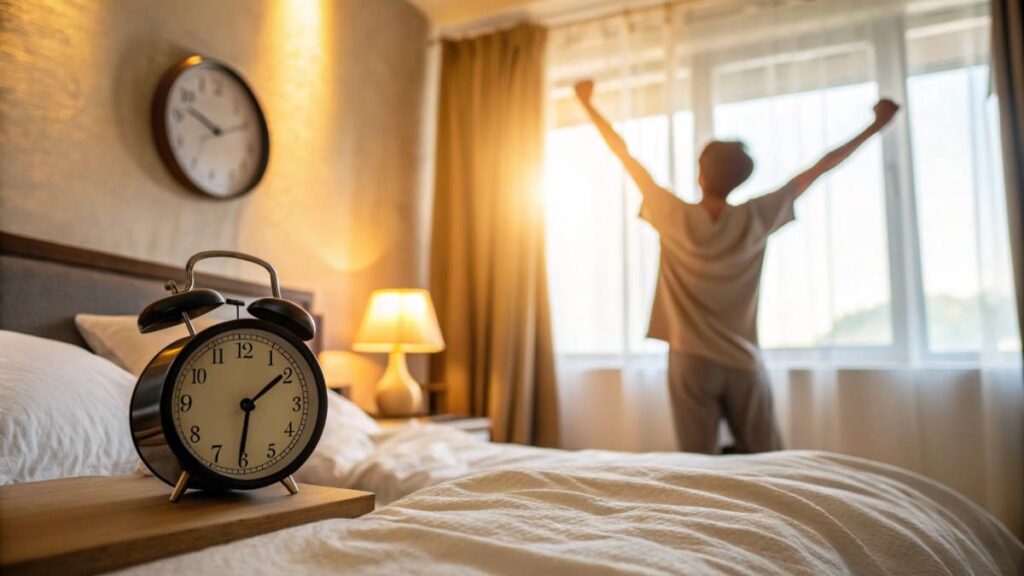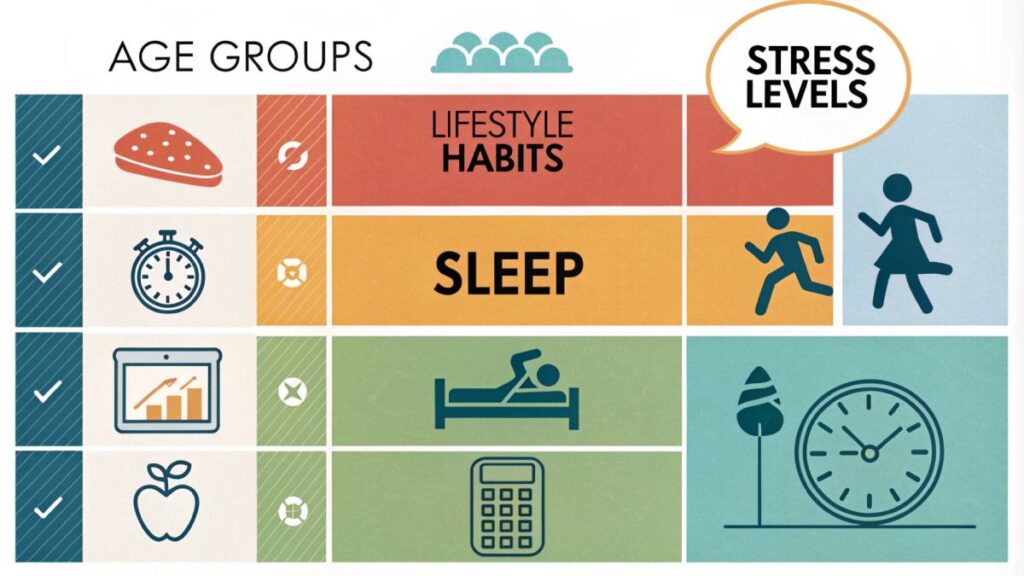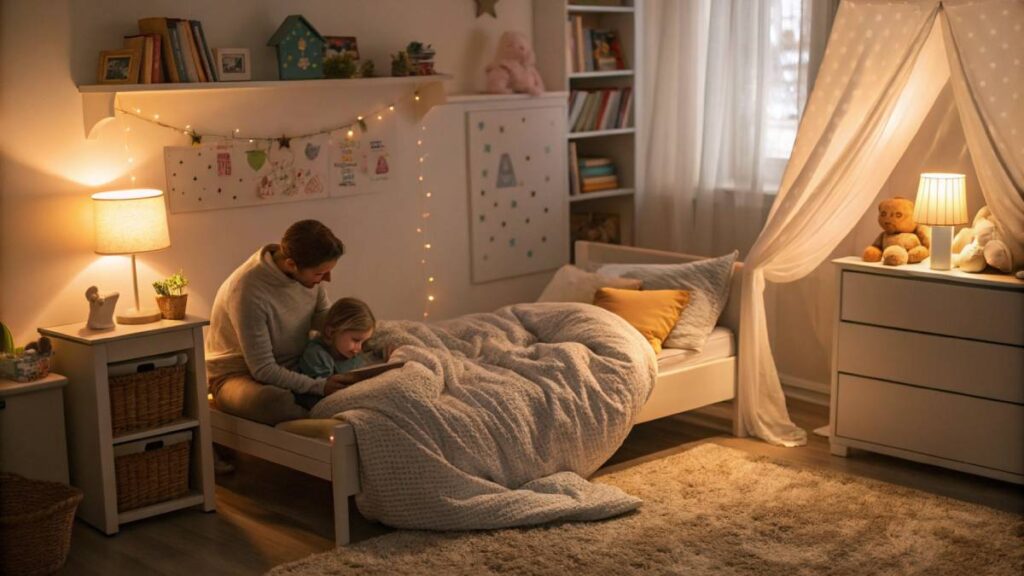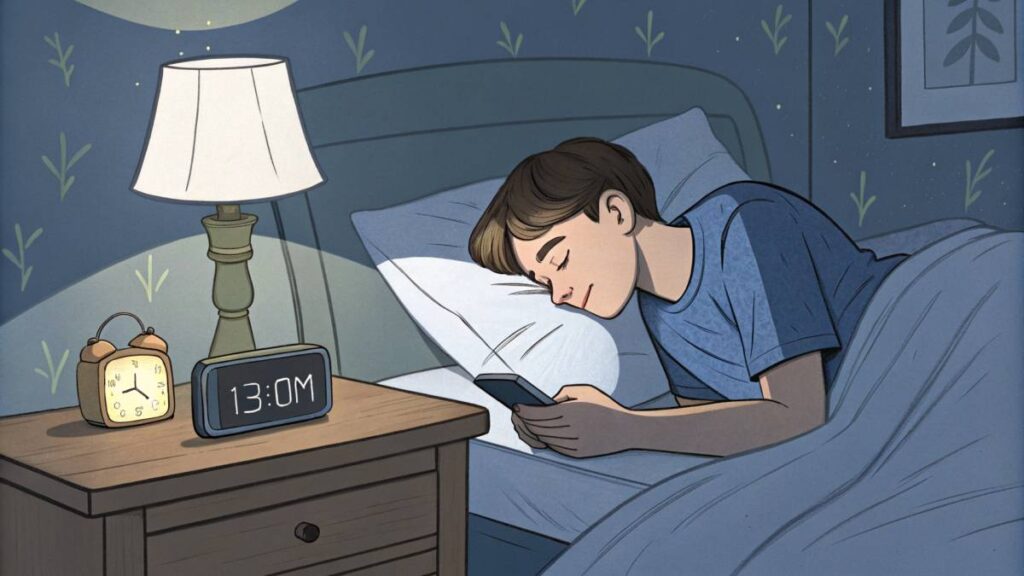What if the secret to brighter mornings, sharper focus, and better health was as simple as sticking to a sleep schedule? Understanding sleep schedules isn’t just about bedtime—it’s about aligning with your body’s natural rhythm to unlock deep rest and vibrant days. From toddlers learning bedtime routines to seniors battling restless nights, this guide dives into sleep schedules tailored to every age and lifestyle.
Key Takeaways
- Consistent Sleep Schedules Improve Well-Being:
Regular sleep routines enhance mood, focus, and overall sleep quality. - Factors Affecting Sleep Patterns:
Age, lifestyle habits, stress, and environment play a significant role in disrupting sleep schedules. - Parenting and Sleep:
Establishing bedtime routines and managing naps are crucial for children’s development and behavior. - Teenagers’ Circadian Rhythms:
Teens often experience delayed sleep cycles due to biological changes. Managing screen time and schedules helps ensure adequate rest. - Middle-Aged Adults’ Sleep Adjustments:
Hormonal changes can disrupt sleep. Strategies like routine consistency and creating a restful environment can help. - Seniors and Their Unique Challenges:
Shorter sleep cycles and nighttime awakenings are common. A sleep-friendly environment and regular habits are vital. - Shift Workers and Healthcare Guidance:
Managing irregular hours through light exposure, naps, and fixed schedules can combat fatigue and improve health.
Understanding Sleep Schedules
Getting a grip on sleep schedules is like unlocking the secret to feeling good and living better. This refers to the groove you get into when you hit the sack and rise and shine, which affects how chipper and alert you feel overall.

Importance of a Consistent Sleep Schedule
Having a steady sleep routine is like setting your body’s inner clock, called the circadian rhythm, on autopilot. If you crash and awake around the same time every day, your body gets with the program, leading to top-notch sleep quality and a happier mood.
| Benefit | What’s It Do? |
|---|---|
| Better Zzz’s | Sticking to a pattern gets you deeper, more satisfying sleep. |
| Uplifted Spirits | Being well-rested can boost your spirits and outlook. |
| Sharper Focus | Consistent sleep helps sharpen concentration and brainpower. |
Folks who mix up their sleep times can find themselves nodding off during the day or tossing and turning at night. For parents, making a routine for kiddos is key to sidestepping bedtime hiccups, from baby sleep craziness to preschooler snooze strategies.
“A child’s sleep schedule is the foundation of their mood and learning abilities.” – National Sleep Foundation
Factors Affecting Sleep Patterns
Loads of things can mess with your slumber rhythm, making it tough to keep sleep schedules in line.
| What Throws You Off | How It Affects You |
|---|---|
| Age | Your sleep vibes shift as you go from pregnancy pillow positions to grandparent snoring solutions. |
| Lifestyle Choices | Stuff like what you eat, how you workout, and screen habits can mess with your rest. Take digital habits and dreams for example. |
| Stress and Worry | Your mental well-being can mess with falling asleep or staying asleep. |
| Environment | The vibe of your bedroom, whether it’s dark, quiet, or warm, all changes how well you snooze. |
Grasping these factors can help folks tweak their own routines or lend a hand to others, like teenagers grappling with teen night owls or adults juggling mid-life sleep bumps. Shaping up sleep schedules can bring a world of good vibes, better health, and smoother days.

Parents of Young Children
Getting a solid sleep routine in place for kiddos is like finding gold. It keeps them cheerful and helps their brains grow strong. Setting up the right sleep vibe and tweaking sleep times to fit your little one’s needs can lead to better snooze habits.
Establishing a Bedtime Routine
A steady bedtime routine can teach kids when it’s time to chill. Activities like reading a story or a warm bath send the right signals. You’re aiming for a familiar sequence that lulls them into dreamland peacefully.

It’s smart to keep this routine around 30 minutes to an hour before lights out. This way, the jump from busy playtime to sleepy time is smooth as butter. Check out this handy bedtime schedule:
| Activity | Duration |
|---|---|
| Quiet Playtime | 10 minutes |
| Bath Time | 15 minutes |
| Storytime | 15 minutes |
| Sleep | Whenever they nod off |
This setup builds a comfy, sleepy vibe. Stick to it because kids love knowing what’s coming next.
Navigating Nap Transitions
As kids get bigger, their napping habits shift. You’ll likely tweak your kiddo’s nap routine as they grow. For example, many toddlers go from two naps to one between ages 15 to 18 months. Spotting those sleepy signals helps you know when it’s time for a change, promising longer, better snooze at night.
Here’s a general idea for napping stages:
| Age Group | Number of Naps | Typical Duration |
|---|---|---|
| Newborns (0-3 months) | 3-4 naps | 30 minutes to 2 hours |
| Infants (4-11 months) | 2-3 naps | 30 minutes to 2 hours |
| Toddlers (1-3 years) | 1-2 naps | 1-3 hours |
| Preschoolers (3-5 years) | 1 nap (maybe none) | 1-2 hours |
Every kid is different, so it’s good to stay tuned to their sleep needs. Some preschoolers might still need a nap, while others might be fine without it.
Keep an eye on stuff like screen time and sleep, especially close to bed. Too much screen time can mess with their sleep mojo. Watching how your child sleeps and adjusting when needed can mean sweeter dreams for everyone in the house.
Teenagers and Young Adults
Sleep schedules can get pretty mixed up when you’re in your teens or early twenties, thanks to everything from raging hormones to social drama. Unlock the secrets behind these changes to help teenagers and young adults catch some quality z’s.

Impact of Circadian Rhythms
Circadian rhythms, our internal clocks, keep us on track with sleeping and waking up. Teenagers might suddenly flip into night owls, thanks to those wild hormone swings. It’s like their bodies hit snooze on a bedtime, pushing it past midnight – ever heard of “delayed sleep phase syndrome”? That’s the fancy term for when teens find it tough to nod off before the clock strikes twelve.
Here’s how much shut-eye teenagers and young adults should aim for nightly:
| Age Group | Recommended Sleep Duration |
|---|---|
| Teenagers (14-17) | 8-10 hours |
| Young Adults (18-25) | 7-9 hours |
Getting a hang of how these rhythms sneakily direct teenage sleep patterns is half the battle. Want to tackle it? Keep a steady sleep routine and ditch those screens an hour before bed. Need more in-the-know info? Dive deeper into our piece on teenage sleep deprivation.
Balancing Social Life and Sleep Needs
Being a teenager or young adult is like juggling flaming torches. Between the late-night hangs, extracurricular madness, and school work, sleep sometimes gets the boot. But ditching sleep for a social spree can mess with mood, focus, and overall health.
It’s all about managing time cleverly. Here’s some advice to help carve out enough time for sleep while keeping life fun:
- Plan Ahead: Markdown social plans and school workloads in a planner to stay on top of things.
- Establish “No Sleep” Zones: Firmly say no to late-night escapades on school nights to grab that much-needed rest.
- Limit Screen Time: Cut back on screen action before hitting the hay to boost sleep quality. More details await in our article about screen time and sleep.
All things considered, winding down with a decent sleep routine can do wonders for young folks. By syncing with their body’s rhythm and managing their social hustle wisely, both teenagers and young adults can smooth out their sleep schedules and feel great every day.
Middle-Aged Adults
As people cruise into middle age, their sleep patterns often undergo some big changes thanks to our lovely old friend, hormones. Getting the right knowledge about these night-time nuisances and picking up some good sleep habits can really help with getting those dreamy, restful Zs.
“Consistent routines align your body’s natural rhythm for better energy and focus.” – American Academy of Pediatrics
Hormonal Changes and Sleep
When you hit middle age, those sneaky hormones can wreak havoc on your sleep. Women might find themselves tackling perimenopause, which can stir up a storm of night sweats, insomnia, and those nightly wake-up calls. Men are not off the hook either, as shifts in testosterone can lead to restless nights.
Here’s a quick peek at how these hormonal changes might play out:
| Hormonal Change | Potential Sleep Impact |
|---|---|
| Estrogen Levels Dip (Women) | More insomnia and the dreaded night sweats |
| Progesterone Rollercoaster (Women) | Trouble staying asleep |
| Testosterone Dips (Men) | Broken sleep patterns |
Knowing these shifts can help folks tweak their sleep routines to roll with the punches.
Strategies for Healthier Sleep Habits
To snag better sleep, middle-aged adults might want to try these tidbits:
- Stick to a Sleep Schedule: Hitting the hay and rising at the same time daily can work wonders for your body’s clock. Consistency is your snooze button’s best buddy!
- Make Your Bedroom a Sleep Sanctuary: Think dark, quiet, and cool. Get comfy with bedding that feels just right for you.
- Cut Back on Screens Before Bed: Give screens the boot at least an hour before sleep to dodge that pesky blue light. For the full scoop, check out our article on screen time and sleep.
- Relax like a Pro: Try meditation, yoga, or just some deep breathing to mellow out and set the stage for snooze time.
- Keep an Eye on Your Diet: Skip heavy meals, caffeine, or booze before bed. Light snacks and plenty of water can help send you off to dreamland.
- Get Moving During the Day: Exercise can really amp up sleep quality, just don’t push it too close to bedtime or you’ll be too wired.
- When in Doubt, See a Doc: If tossing and turning become the norm, it might be time to chat with a healthcare provider. They can help spot sleep disorders or suggest treatments. For deeper dives, read our stuff on sleep and cognitive health and perimenopause sleep issues.
By keeping an eye on hormone drama and giving these sleep strategies a go, middle-aged adults can catch better Zs and adjust their sleep habits to keep things smooth sailing.
Seniors and Their Caregivers
As folks get on in years, their sleep can start to resemble a symphony of tossing and turning more than a tranquil lullaby. Knowing what to expect and sprucing up the bedroom just right can help seniors snag those elusive Z’s.
Age-Related Sleep Changes
Older adults often find that their sleep takes a hit; it’s a bit like shifting from a luxury cruise to a crowded bus ride. Here’s the rundown on what might change as the candles on the birthday cake multiply:
| Sleep Hiccup | What’s Going On |
|---|---|
| Shorter Sleep | Clocking fewer hours in dreamland, most seniors hover around 6-7 hours of shut-eye. |
| Funky Sleep Cycles | The body’s clock might push for an earlier bedtime, leading to bleary-eyed sunrises. |
| More Tossing & Turning | The midnight shuffle becomes a routine, cutting into quality sleep. |
| Trouble Getting to Sleep | Falling into slumber can be as elusive as missing socks in the dryer, thanks to worries or aches. |
Caregivers can play a helpful role by tuning into these shifts and coming up with ways to make those sleepless nights a little less eventful.
Creating a Comforting Sleep Environment
Think of crafting a sleep oasis for the old-timers. It’s all about dialing up the comfort factor to encourage peaceful snoozes. Consider these fixes:
| Steer towards mattresses and pillows that give older backs a break. Check out these tips on the best mattresses for seniors. | Handy Tips |
|---|---|
| Bedding Bonanza | Tame racket with white noise machines or padding to soften sounds. Peek at suggestions from the best white noise machines for babies. |
| Chill Room | Cooler temperatures work wonders for smoothing the path to dreamland. |
| Shhh…Keep Quiet | Tame racket with white noise machines or padding to soften sounds. Peek at suggestions from the best white noise machines for babies. |
| Dim the Lights | Blackout curtains can keep sunlight at bay and help maintain a sleep-friendly vibe. |
| Easy Reach | Keep necessities like specs or pills close by to fend off nighttime hurdles. |
By giving thought to these tweaks, seniors and their sidekicks can set up a sleep-buddy environment that’s fitting. Snagging good sleep starts with embracing what changes and lending a hand to boost sleep quality to new heights. Curious caregivers might also want to check out more helpful reads like Senior Sleep Apnea or improve sleep naturally.

Healthcare Professionals
Healthcare folks are the unsung heroes tackling sleep troubles across all ages. Mastering the art of sleep schedule tweaks is a must, especially for shift workers and anyone needing a little help reshuffling their bedtime habits.
Tackling Shift Work Sleep Disorder
Shift work sleep whammy messes with people who clock in at odd hours, making their Z’s all over the place and turning their snooze schedule topsy-turvy. These folks often battle fatigue, alertness nosedives, and a slew of health hiccups.
Here are the signs you might recognize if shift work is messing with a person’s sleep mojo:
| Symptoms | Description |
|---|---|
| Insomnia | You just can’t catch the sleep train during daylight. |
| Excessive Sleepiness | Struggling to keep your eyse open at work, feeling like a zombie. |
| Mood Changes | Cranky or stressed, courtesy of not enough shut-eye. |
Healthcare gurus offer tips to manage this sleep muddle, such as:
- Regular Sleep Routine: Keeping the sleep-wake schedule fixed, even on lazy days.
- Light Exposure: Playing with light to cue the body when it’s nap time or wake-up time.
- Napping: Sneaking in mini-snoozes to crank up alertness at work.
Curious about more tips for healthcare workers and sleep? Dive into our piece on sleep tips for 30s.
Helping Patients Tweak Their Sleep Schedules
Anyone, no matter their age, can use a little help fine-tuning their sleep clocks for dreamier nights. Healthcare whizzes should dish out tips customized to fit the quirky lifestyles and sleep goals of their patients.
Check out these areas where healthcare pros can lend a hand:
- Sleep Hygiene Practices: Schooling folks on building a cozy sleep nest with habits to match.
- Gradual Adjustments: Easing into different sleep hours instead of flipping schedules on a dime, making it less jarring for the body.
- Monitoring Sleep Patterns: Employing sleep diaries or apps to spot trends and hitches, making tweaks smoother.
| Age Group | Recommended Sleep Hours | Adjusting Techniques |
|---|---|---|
| Infants | 14-17 hours | Steady bedtime rituals (a nice bath, some lullabies) |
| Toddlers | 11-14 hours | Consistent naps and bedtime routines |
| Teens | 8-10 hours | Cutting back screen time; getting help with school schedules |
| Adults | 7-9 hours | Fixed bedtime; relaxation hacks |
| Seniors | 7-8 hours | Cozy sleeping space; minding ongoing health stuff |
Armed with these pointers, healthcare professionals can steer folks toward boss-level sleep health. For deeper dives into life-stage-specific sleep hurdles like new baby sleep chaos or menopause bumps, scope out our reads on postpartum sleep tips and perimenopause sleep issues.
Conclusion:
No matter your age or stage in life, mastering your sleep schedule is the key to unlocking better health and daily productivity. Whether it’s crafting bedtime routines for your little ones, navigating teenage circadian rhythms, or tackling middle-aged and senior sleep challenges, a consistent approach pays off. By understanding the factors that influence sleep and tailoring strategies accordingly, you can embrace a well-rested life. Sweet dreams start with smart habits—start yours today!
FAQs
What is a sleep schedule, and why is it important?
A sleep schedule refers to a consistent routine for going to bed and waking up. It aligns your circadian rhythm, improving sleep quality and overall health.
How can I help my child establish a bedtime routine?
Introduce relaxing activities like reading or a bath 30–60 minutes before bed. Stick to consistent sleep and wake times for best results.
Why do teenagers struggle with sleep schedules?
Hormonal changes during adolescence often delay their natural sleep-wake cycle. Limiting screen time and keeping regular schedules can help.
What can middle-aged adults do to improve sleep?
Create a comfortable sleeping environment, maintain consistent routines, and avoid screens or heavy meals before bedtime.
How can shift workers manage irregular sleep patterns?
Use light exposure to signal sleep and wake times, take strategic naps, and maintain a consistent sleep routine on off days.
Resources
- National Sleep Foundation – Comprehensive sleep health tips.
- CDC Sleep and Sleep Disorders – Reliable insights on sleep-related health topics.
- Better Sleep Council – Expert advice on creating the best sleep environment.
- American Academy of Sleep Medicine – Tools for understanding sleep disorders.








